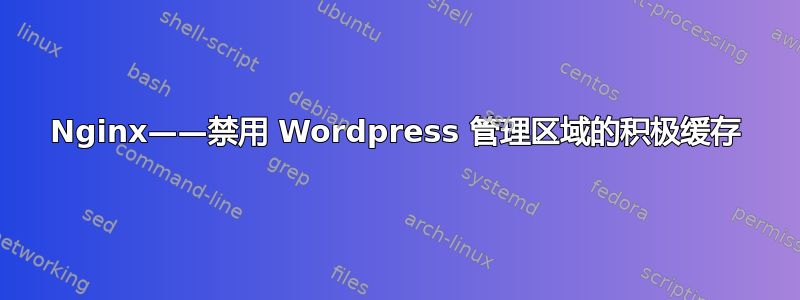
我现在已经安装好了 Nginx,并安装了 PHP-FPM。我来自一个使用 Nginx 代理的 Apache 世界。
看来 Nginx 有自己的喜怒无常的缓存,非常激进。缓存有几层:
Nginx 的 fastcgi 缓存本身。在我的 nginx.conf 中,我有以下设置:
fastcgi_cache_path /var/run/nginx-cache levels=1:2 keys_zone=WORDPRESS:100m inactive=60m; fastcgi_cache_key "$scheme$request_method$host$request_uri"; fastcgi_cache_use_stale error timeout invalid_header http_500; fastcgi_ignore_headers Cache-Control Expires Set-Cookie;然后是 php opcache。我暂时禁用了它:
;zend_extension=opcache.so opcache.enable=0 opcache.enable_cli=0 opcache.memory_consumption=250 opcache.interned_strings_buffer=8 opcache.max_accelerated_files=6000 opcache.revalidate_freq=600 opcache.fast_shutdown=1我在服务器块中还包含以下跳过缓存指令:
set $skip_cache 0; # POST requests and urls with a query string should always go to PHP if ($request_method = POST) { set $skip_cache 1; } if ($query_string != "") { set $skip_cache 1; } #Don't cache the following URLs if ($request_uri ~* "/(wp-login.php|wp-admin|login.php|backend|admin)"){ set $skip_cache 1; } #Don't cache if there is a cookie called PHPSESSID if ($http_cookie ~* "PHPSESSID"){ set $skip_cache 1; } #Don't cache if there is a cookie called wordpress_logged_in_[hash] if ($http_cookie ~* "wordpress_logged_in_"){ set $skip_cache 1; } # Don't cache uris containing the following segments if ($request_uri ~* "cms/|/wp-admin/|/xmlrpc.php|wp-.*.php|/feed/|index.php|sitemap(_index)?.xml") { set $skip_cache 1; } # For the arc if ($request_uri ~* "site/|/wp-admin/|/xmlrpc.php|wp-.*.php|/feed/|index.php|sitemap(_index)?.xml") { set $skip_cache 1; } # Don't use the cache for logged in users or recent commenters if ($http_cookie ~* "comment_author|wordpress_[a-f0-9]+|wp-postpass|wordpress_no_cache|wordpress_logged_in") { set $skip_cache 1; }然后在 PHP 块中,我使用 skip_cache 内容:
location ~ \.php$ { try_files $uri $uri/ =404; fastcgi_split_path_info ^(.+\.php)(/.+)$; fastcgi_pass unix:/var/run/php-fpm/php-fpm.sock; fastcgi_index index.php; fastcgi_param SCRIPT_FILENAME $document_root$fastcgi_script_name; include fastcgi_params; fastcgi_cache_bypass $skip_cache; fastcgi_no_cache $skip_cache; fastcgi_cache WORDPRESS; fastcgi_cache_valid 200 301 302 60m; }
尽管如此,我的管理屏幕缓存得如此之多,以至于当我激活插件时,它会显示旧屏幕。当插件被停用时。只有当我手动刷新页面时,我才能看到插件确实已激活。
我错过了什么?
答案1
@MichaelHampton 建议的方法在我看来是最好的(最简单、最有效),但这里有一个在某些情况下可能有用的替代/附加方法。它来自我的Wordpress / Nginx 教程。有些主题会以非常糟糕的方式干扰缓存标头,因此我基本上想针对网站的不同区域以不同的方式重写所有标头。我还删除了旧的 Pragma 标头。
我为特定的 URL 或子目录定义了块,以便可以更精确地限制速率或控制标题。
请注意,“more_clear_headers”和“add_header”是Headers 更多 Nginx 扩展。如果您查看我上面链接的教程第二部分,它会逐步说明如何使用该模块构建 Nginx - 这非常简单。
# Rate limiting for login pages
limit_req_zone $binary_remote_addr zone=login:1m rate=5r/m;
# Rate limit wp-login.php to help prevent brute force attacks
location = /blog/wp-login.php {
# Next line applies the rate limit defined above
limit_req zone=login burst=3;
fastcgi_keep_conn on;
fastcgi_intercept_errors on;
fastcgi_pass php;
include fastcgi_params;
fastcgi_param SCRIPT_FILENAME $document_root$fastcgi_script_name;
more_clear_headers "Cache-Control";
more_clear_headers Server; more_clear_headers "Pragma"; more_clear_headers "Expires";
# No caching
more_clear_headers "Cache-Control";
add_header Cache-Control "private, max-age=0, no-cache, no-store";
more_clear_headers "Expires";
# Debugging aid - remove
# add_header Z_LOCATION "WP-LOGIN"; add_header URI $uri;
}
# Wordpress admin caching headers are generally set correctly, for pages and resources. The only reason we define
# this block separately is to avoid messing with the headers in the main php block.
# This is probably unnecessary because of the skip_cache variable and may be removed
location ~* wp-admin {
fastcgi_keep_conn on;
fastcgi_intercept_errors on;
fastcgi_pass php;
include fastcgi_params;
fastcgi_param SCRIPT_FILENAME $document_root$fastcgi_script_name;
# Debugging aid - remove
# add_header Z_LOCATION "WP_ADMIN"; add_header URI $uri; add_header "Z_SKIP_CACHE" $skip_cache;
}
为了补充 Michael 的回答,我还使用了这个块。它以第二种方式禁用了 Wordpress Admin 的缓存,还禁用了 feed、sitemap、xmlrpc 和其他一些缓存。部分是用于 Wordpress,我怀疑部分是用于我运行的自定义 PHP 网站。
if ($request_uri ~* "/wp-admin/|/admin-*|/purge*|/xmlrpc.php|wp-.*.php|/feed/|sitemap(_index)?.xml|wp-cron") {
set $fastcgi_nocache "true";
}
答案2
这段配置看起来很熟悉。我想它可能来自 WordPress wiki。无论如何,它太复杂了,而且大多没有必要。
我将从实时 WordPress 网站中提取我的配置:
set $fastcgi_nocache "";
if ($http_cookie ~ (comment_author_.*|wordpress_logged_in.*|wp-postpass_.*)) {
set $fastcgi_nocache "true";
}
fastcgi_ignore_headers Expires Cache-Control;
fastcgi_hide_header Pragma;
fastcgi_cache_bypass $fastcgi_nocache;
fastcgi_no_cache $fastcgi_nocache;
就这些。您真正需要检查的唯一一件事是用户是否有一个 cookie 表明他已登录、是否留下了评论并希望被记住,或者是否输入了帖子密码。其他一切都无关紧要或不适用于 WordPress。
答案3
几个月来我都遇到同样的问题...尝试了许多不同的 Nginx 配置...但都没有用。
问题:
- 管理后端已被缓存,因此在创建新页面或安装插件时不会更新。
- 在前端和后端之间切换,甚至单击链接时都会重定向以重新进行授权。
只是一个简单的问题:CLOUDFLARE
我的页面规则如下:
*.mysite.com/* - Cache Level: Cache Everything
我删除了该规则,清除了缓存,现在一切恢复正常。


